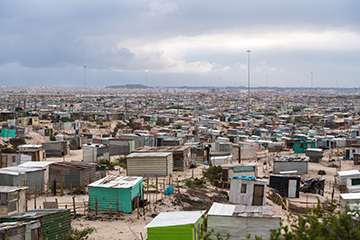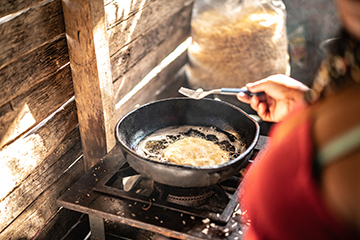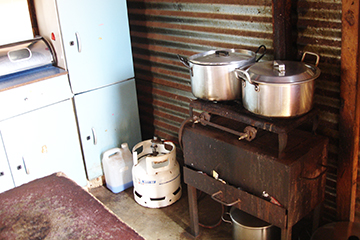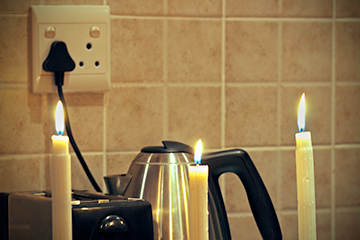Safety using: gas, paraffin and candles

With Eskom's regular load shedding schedule in full-swing, it is likely that the use of electricity alternatives are common across many homes in the province.
Gas, paraffin and candles are often used as a means to combat some of the inconveniences that come with load-shedding, but it is important to remember that energy sources involving open flames can be a hazard if they aren’t managed or monitored correctly.
Using alternative cooking and heating methods in informal settlements pose great risks for devastating fires as home structures are normally built closer together, allowing fire to spread easily and quickly.
Most fires can be prevented if some basic safety rules are followed. We've put together some tips to help protect you from fires if you make use of open flame electricity alternatives.
Fire safety
Fire can be divided into elements, which if all are present, will sustain combustion until one of them is removed or depleted. These equally important components of fire are:
- fuel (e.g. wood, paper),
- oxygen (or other oxidising agents), and
- heat (or energy).
If 1 of these elements aren’t present or removed then a fire can’t occur.

Paraffin
The use of paraffin stoves and heaters has introduced the problem of storage and handling of the fuel.
Safety tips:
- Store paraffin in a clearly marked container with the name of the contents.
- Never leave paraffin in a drinking glass as someone may mistake it for drinking water.
- Use a universal childproof safety cap on the container and store it out of reach from children. (Never use a childproof safety cap on non-compatible containers with fluids used for drinking. This can lead to a child opening a container with a toxic fluid and drinking it).
- Always turn a paraffin stove or lamp off before going to bed.
- Keep stoves and heaters at least 1m away from anything that can burn.
- Paraffin appliances must never be operated unattended.
- A heater must be at least 1m away from anything that may catch fire (e.g. clothing, furniture, curtains etc).
- Never mix with any other flammable liquid, especially petrol. If the wrong fuel is used it could burn hotter than the equipment’s design limits and cause a serious fire.
- Use paraffin from a reputable dealer only. Contaminated or impure paraffin can cause an increase in harmful emissions, which could result in health problems.
- Keep heaters out of pathways and possible escape routes in the event of a fire.
- Keep stoves and lamps on a firm, flat surface to prevent them from falling and starting a fire (not on a cardboard box).
- Always fill the stove or lamp using a funnel to prevent spillage.
- Always refuel outdoors to prevent spillage on floors and carpets, which could later result in a fire.
- Turn off heating equipment and allow cooling before refuelling to prevent flare-ups.
- Keep the room in which the heater is operated well-ventilated (door or window slightly open). This will prevent indoor air pollution and possible health problems.
- Never try to move a heater while it's being used or if a flare-up occurs.
- Don't try to smother a flame with a blanket, rather turn the valve off. Moving the heater may increase the height of the flames and cause leakage resulting in injury.
Always remember:
- A paraffin heater must be turned off before you go to bed.
- Never move a paraffin stove when it's lit.
- Fill the paraffin stove/heater outdoors, away from children and only when the appliance is cooled down.
- Never use lower grade fuel or petrol in a paraffin stove/heater.
- Allow cooling before refuelling.
- Always fill the stove or lamp using a funnel.
- Place the heater so that it can't be knocked over easily.
Liquid Petroleum Gas (LPG)
 A fire or explosion with LP gas usually involves leaks or failures in the system.
A fire or explosion with LP gas usually involves leaks or failures in the system.
Here are a few safety tips to keep in mind:
- LPG cylinders must be installed and maintained by a certified and qualified technician.
- Other flammable fuels, rubbish and dry leaves or vegetation must be cleared away from any gas cylinders to avoid a potential fire coming into contact with the cylinders. If there's a power failure, don't place a gas cylinder on the stove. This will prevent a potential explosion in case the electricity goes back on.
- Never extinguish the flame with water in case there's a leak.
- Never move a gas heater when it’s burning or hot.
- If you smell gas, turn off all gas supplies immediately, open all doors and windows and don’t smoke or switch any lights or electrical appliance on. Extinguish any naked flames and call the Fire department.
- If a gas leak is burning, turn the valve off.
- To close the valve remember: righty tighty – lefty loosey.
- Unvented heaters shouldn’t be used in small-enclosed areas, especially bedrooms because of the potential for carbon monoxide poisoning.
- Follow the manufacturer’s instructions for lighting the pilot. Gas vapours may accumulate and ignite explosively, burning your face or hand.
- If needed, use matches to light the pilot, before turning on the gas to prevent gas build-up.
- Gas cylinders should be stored outdoors or in a well-ventilated area.
Candles 
- Place burning candles in sturdy non-combustible holders.
- Keep burning candles well away from curtains, decorations and other combustible materials.
- Never leave children in a room alone with lit candles.
- Be cautious when carrying or moving lit candles to avoid dripping hot wax on a child and causing unnecessary burns.
- Never allow a young child to move or carry a lit candle.
- Don’t display lighted candles in a window or near exits in case you need to use 1 of these exits to escape.
- Never decorate any Christmas tree with lit candles.
- Keep lit candles away from children.
Read more about preventing fires in the Western Cape.


